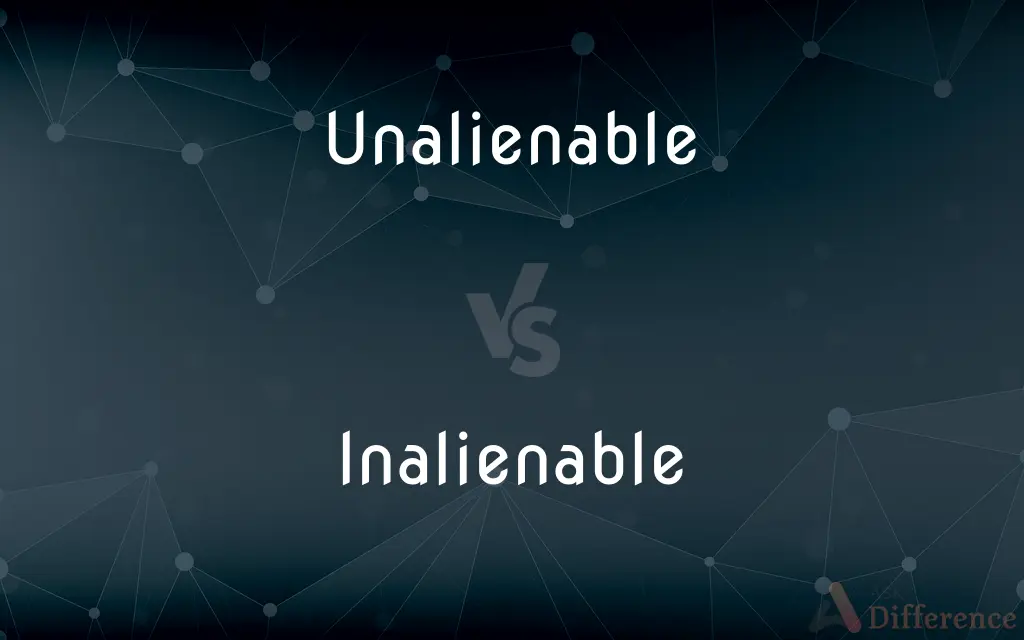Unalienable vs. Inalienable — What's the Difference?
By Tayyaba Rehman & Maham Liaqat — Updated on March 29, 2024
Both "unalienable" and "inalienable" refer to rights that cannot be taken away or denied, but "unalienable" is more commonly used in historical documents, while "inalienable" is preferred in modern legal contexts.

Difference Between Unalienable and Inalienable
Table of Contents
ADVERTISEMENT
Key Differences
"Unalienable" and "inalienable" are terms deeply embedded within the discourse of rights and freedoms, both signifying rights that cannot be surrendered, sold, or transferred from the individual. "Unalienable," historically linked with the Declaration of Independence and its assertion of fundamental human rights, carries a weight of historical significance and is often associated with the foundational principles of the United States. On the other hand, "inalienable" is more frequently used in contemporary legal documents and human rights discussions, indicating its broader acceptance and application in today's legal and philosophical language.
The distinction between "unalienable" and "inalienable," while subtle, lies in their usage and the contexts in which they are preferred. "Unalienable" evokes a sense of historical continuity and tradition, particularly within American political culture. It is emblematic of the struggle for freedom and the inherent rights deemed essential by the nation's founders. Whereas "inalienable" is more commonly found in international treaties, declarations, and legal texts, reflecting a universal consensus on the indivisibility of certain human rights, regardless of nationality or era.
Linguistically, the prefix differences - "un-" in "unalienable" and "in-" in "inalienable" - do not significantly alter the meaning of the base word "alienable," which means capable of being alienated, or transferred to another's ownership. However, the choice between these prefixes can reflect stylistic preferences, historical influences, or the desire for clarity in legal language. "Inalienable" is perceived as clearer and more straightforward by some legal scholars and writers, which may contribute to its prevalence in modern legal frameworks.
In the realm of philosophy and ethics, both terms are used to argue for the inherent rights that belong to individuals by virtue of their humanity. These rights are considered fundamental to the individual's existence and dignity, and cannot be justly removed or diminished by external forces. Whether one uses "unalienable" or "inalienable," the underlying principle remains a cornerstone of democratic societies and human rights advocacy.
Despite their near-interchangeable meanings, the choice between "unalienable" and "inalienable" can be influenced by tradition, context, and precision in language. Both terms continue to play a vital role in discussions on rights and freedoms, emphasizing the enduring belief in inherent human rights that transcend legal and political boundaries.
ADVERTISEMENT
Comparison Chart
Historical Usage
Predominantly in early American documents, like the Declaration of Independence.
Less common in early historical documents.
Modern Usage
Less common in contemporary legal texts.
Preferred in modern legal and human rights contexts.
Connotation
Emphasizes historical and philosophical roots in American political thought.
Emphasizes universality and applicability in current legal standards.
Linguistic Preference
Favored for its traditional significance.
Favored for clarity and international understanding.
Contexts
Often used in discussions of fundamental human rights within a historical or traditional American framework.
Used in global human rights discourse and contemporary legal documents.
Compare with Definitions
Unalienable
Rights that cannot be taken away or denied, historically significant in American documents.
The Declaration of Independence states that all men are endowed with certain unalienable Rights.
Inalienable
Rights that cannot be given away or taken away, commonly used in modern legal contexts.
Human rights are inalienable and must be protected by all governments.
Unalienable
Implies rights that are fundamental and inherent.
Life, liberty, and the pursuit of happiness are considered unalienable.
Inalienable
Reflects a universal principle applicable to all humans.
Every human being is born with inalienable rights.
Unalienable
Pertaining to rights inherent to every person.
Freedom of speech is an unalienable right in the United States.
Inalienable
Used in international treaties and declarations.
The Universal Declaration of Human Rights outlines the inalienable rights of every individual.
Unalienable
Often used in philosophical or political arguments.
His speech emphasized the unalienable rights of all individuals.
Inalienable
Represents a contemporary legal and ethical stance on human rights.
In today's legal framework, the protection of inalienable rights is paramount.
Unalienable
Symbolizes a historical perspective on human rights.
The founding fathers believed in protecting the unalienable rights of citizens.
Inalienable
Implies a broad, global understanding of fundamental rights.
Inalienable rights are not subject to political changes.
Unalienable
Not to be separated, given away, or taken away; inalienable
"All of them ... claim unalienable dignity as individuals" (Garrison Keillor).
Inalienable
That cannot be transferred to another or others
Inalienable rights.
Unalienable
Not alienable.
Inalienable
Incapable of being alienated, surrendered, or transferred to another; not alienable.
An inalienable right is a right that cannot be given away
Unalienable
Inalienable; as, unalienable rights.
Inalienable
(grammar) Of or pertaining to a noun belonging to a special class in which the possessive construction differs from the norm, especially for particular familial relationships and body parts.
Unalienable
Incapable of being repudiated or transferred to another;
Endowed by their Creator with certain unalienable rights
Inalienable
Incapable of being alienated, surrendered, or transferred to another; not alienable; as, in inalienable birthright.
Inalienable
Incapable of being repudiated or transferred to another;
Endowed by their Creator with certain unalienable rights
Inalienable
Not subject to forfeiture;
An unforfeitable right
Common Curiosities
Why is "unalienable" used in the Declaration of Independence?
"Unalienable" reflects the historical and philosophical views of the time, emphasizing the inherent rights of individuals.
Are "unalienable" and "inalienable" interchangeable?
Yes, in most contexts, they are used interchangeably, although their usage may differ based on tradition or legal preference.
Is "inalienable" more common in international law?
Yes, "inalienable" is more widely used in international treaties and declarations to denote rights that cannot be forfeited.
What does "inalienable" mean?
"Inalienable" also refers to rights that cannot be taken away or denied, commonly used in modern legal and human rights contexts.
What does "unalienable" mean?
"Unalienable" refers to rights that cannot be surrendered, sold, or transferred, emphasized in historical American documents.
Can a right be both unalienable and inalienable?
Yes, since both terms signify rights that cannot be taken away, a right can be described as both unalienable and inalienable.
How do the terms influence legal interpretations?
While they are conceptually similar, the choice of term may affect the framing and interpretation of legal documents and arguments.
Do all countries recognize inalienable rights?
Most democracies recognize inalienable rights as fundamental, though the specific rights and their enforcement vary.
What is an example of an unalienable right?
The right to liberty is often cited as an unalienable right, central to the concept of personal freedom.
How do "unalienable" and "inalienable" rights affect society?
They underpin legal and ethical systems that protect individual freedoms and dignity, influencing societal norms and government policies.
What is an example of an inalienable right?
The right to live free from torture is considered an inalienable human right under international law.
Can unalienable or inalienable rights be limited?
While these rights are fundamental, certain limitations may be applied in specific circumstances, such as national security or public health.
Share Your Discovery

Previous Comparison
Access vs. Assess
Next Comparison
Stuporous vs. ObtundedAuthor Spotlight
Written by
Tayyaba RehmanTayyaba Rehman is a distinguished writer, currently serving as a primary contributor to askdifference.com. As a researcher in semantics and etymology, Tayyaba's passion for the complexity of languages and their distinctions has found a perfect home on the platform. Tayyaba delves into the intricacies of language, distinguishing between commonly confused words and phrases, thereby providing clarity for readers worldwide.
Co-written by
Maham Liaqat















































